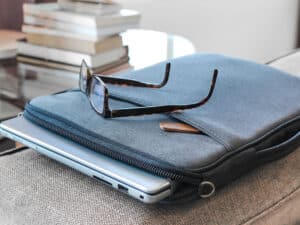How to succeed in a remote interview

This new way of working is something that even those of us who are accustomed to remote working may find challenging, especially with a house full of people and perhaps juggling parenting and homeschooling with the day job!
If you are currently looking for your next role, be it permanent or interim, and are successful in getting an interview, you are likely to have to conduct this from home either over the phone or via video call. This article is designed to help you prepare for and conduct a remote interview to ensure you give the best impression possible.
Firstly, preparation is just as important for a remote interview as it is for one that is face to face, so don’t forget the basics such as knowing your CV, understanding the role you’ve applied for and researching the organisation and your interviewers. In addition, if interviewing over the phone or video call, the following preparation is important:
- Choose a room where you will not be disturbed. If there are others in the house, let them know you must not be disturbed and maybe put a sign on your front door to make sure no one rings the doorbell (or someone in your house is available to answer for you). Make sure there are no distractions in the room; turn off any devices you will not need for the interview.
- Dress as you would for a face to face interview; make sure your hair looks tidy and you are sitting up straight. You will perform better if you feel smart and look the part.
- Choose your background and lighting; make sure the room is not cluttered, you haven’t got any controversial art on the wall behind you, the camera is looking directly at your face (this is not the forum at which to display your “favourite side”!), and you don’t have a light shining directly at your face.
- Check that the technology is working properly with a trial run; this includes making sure you have a good internet connection and that the sound of your voice is not distorted. Make sure you have downloaded the software you need and that your laptop, if you are using one, is plugged in or has a full battery.
- Have your CV and the job spec with you in case you need to refer to them. This is particularly useful if the interview is over the phone as the interviewer can’t see you using your prompts. It might also help to highlight parts of your CV that are relevant to the role and have a list of your proudest recent work achievements to hand so that you can weave them into your competency-based responses.
- Have a pen and paper handy so that you can take a note of any questions that pop into your head that you want to ask at the end but be careful not to shuffle your papers as this sort of noise is easily picked up by device microphones. In addition, have a glass of water in case your throat succumbs to nerves (but don’t slurp)!
During the interview, if it is over the phone you may feel at a slight disadvantage given you are not able to read any body language that would usually help tell you whether you are on the right track or signal when your interviewer wants you to stop talking and move on. There are methods you can use to help overcome this, for example by signposting a response before you launch in. One way of signposting would be to ask, “Well, I could use the example of when I did X on this client project, is that the sort of thing you are looking for?” before responding to a question you are not sure about. In addition, don’t be afraid to ask for clarification or repetition of a question if things are not clear.
Signposting your responses can also substitute for body language and help the interviewer know when you have finished your explanation. For example, you can say “I have three examples I think are relevant, the first is…., the second is……, the third is….” and then it is clear to the interviewer when you have finished your explanation.
Remember to smile when you are talking, even if you are only on the phone; it adds a positive inflexion to your voice that an interviewer will be able to pick up.
If the interview is via a video call, look straight at the camera when you are speaking, acknowledge their questions and demonstrate that you are listening by nodding, otherwise try to stay still as too much movement, such as arm-waving, will be a distraction.
Speak slowly and don’t be afraid of pauses as you will form a better answer if you give it some thinking time. If you feel there are a lot of pauses, again signpost them by asking for a little time to think about your response.
At the end of the interview, thank the interviewer(s) for their time and let them know you look forward to hearing from them or your recruiter regarding the next steps then say goodbye and close down the call.
And finally, back to my first point, prepare! Get everything set up and working properly, including you. Sit up straight and practice your responses, speaking clearly; this is not the sort of situation many of us regularly find ourselves in and the sound of our own voice, talking about ourselves for over an hour can be quite strange so make sure your preparation includes speaking out loud about yourself, your role and your achievements.
See more career advice or read more articles.



